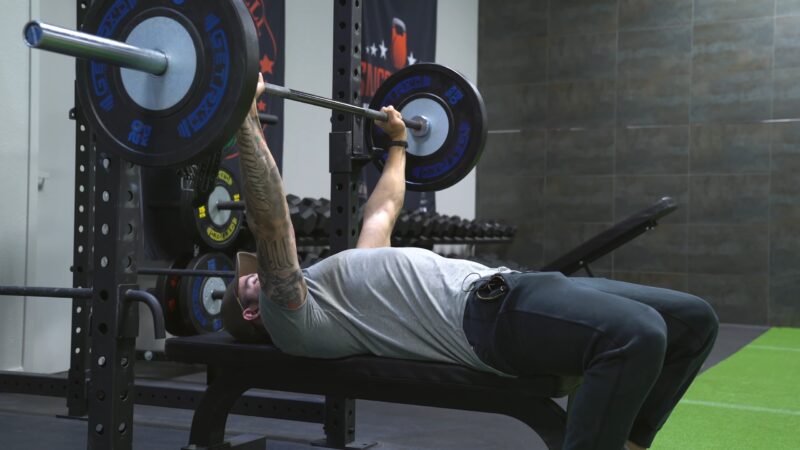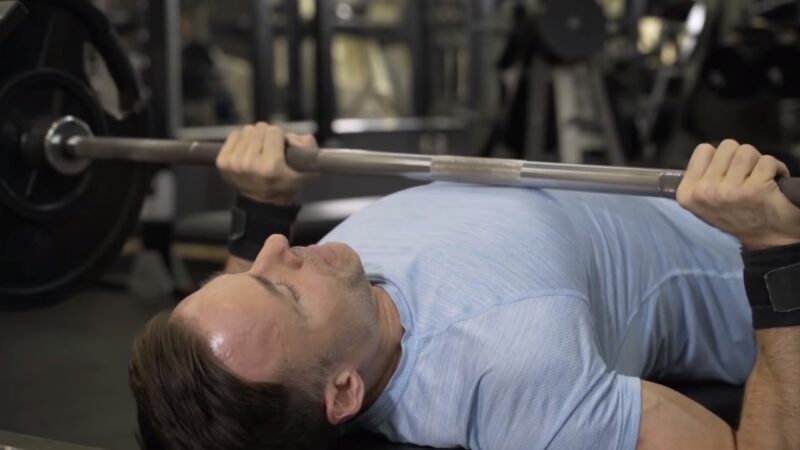Bench pressing is more than just an ego booster or an activity to impress your friends at the gym. It’s a complete upper-body workout that measures your strength and aids in building muscle mass. The inevitable question then arises, “How much should I be able to bench?”
This query is so common, yet it’s shrouded in myths, misconceptions, and even some unnecessary machismo. Today, we will talk about this ever-persistent question. Buckle up as we will explore the mechanics, strategies, and benchmarks for a stronger, healthier you!
The Importance of Bench Press in Your Fitness Regimen

The bench press is an iconic workout in gyms worldwide for good reason. It targets multiple muscle groups, including the pectorals, triceps, and anterior deltoids. Consistent bench pressing helps not only in strength development but also in sculpting your physique. But that’s not all. Here’s a quick rundown on some more benefits:
- Strengthens the Core: Despite being an upper-body exercise, it engages your core too.
- Functional Strength: The pushing motion replicates many real-world activities.
- Psychological Benefits: Boosts self-confidence as you see your strength increase over time.
What the Bench Press Tells You About Your Fitness
A well-executed bench press can serve as a benchmark (no pun intended) for your overall fitness level. This exercise can reveal several insights into your muscular balance, core strength, and even mental toughness. By carefully examining your performance, you can identify weaknesses and imbalances in your fitness regimen, providing a roadmap for areas to improve.
The Key Mechanics
The Fundamentals
Understanding the basics is essential for safe and effective bench pressing. Grip width, back positioning, and the barbell path all play a pivotal role. The standard grip width is a little wider than the shoulder width apart, but individual comfort varies. Your feet should be firmly planted on the ground, and your back arched just enough to fit a hand through.
The Right Technique
A proper bench press isn’t just about pushing the weight up and dropping it back down. Your focus should be on a controlled motion. Lower the barbell to your mid-chest slowly, then push it back up without locking your elbows completely. A good rule is the 2-1-2 rule: 2 seconds down, 1 second pause, and 2 seconds up.
Equipment and Alternatives
While a barbell and bench are standard, many opt for dumbbells, kettlebells, or even machines. Each has its pros and cons, but they can all be effective in building strength. Dumbbells, for instance, offer a more natural hand movement, while machines are great for isolating the chest muscles. Choose based on your comfort, availability, and specific fitness goals.
Bench Pressing According to Your Body Type
Ectomorphs, Mesomorphs, and Endomorphs
Body types play a crucial role in how you perform and progress in bench pressing. Ectomorphs, characterized by a lean frame and fast metabolism, may find it hard to gain muscle mass.
Mesomorphs, naturally muscular and well-balanced, often excel in strength training exercises like the bench press. Endomorphs, who tend to have a higher fat percentage, may excel in lifting heavier but struggle with endurance.
Customizing Your Routine
Given these differences, each body type will require a tailored approach. Ectomorphs should focus on lower reps but higher weights to facilitate muscle gain. Mesomorphs can adopt a balanced routine, while endomorphs should work on higher reps and lower weights to combine strength training with fat loss.
Bench Press Milestones: What Are the Averages?

Age and Gender Differences
On average, men in their 20s should be able to bench press their body weight for a single repetition. Women of the same age, given differences in muscle mass distribution and hormones, often aim for about 70% of their body weight. As we age, strength naturally declines, so benchmarks will differ for older adults.
Professional vs. Recreational Lifters
A professional powerlifter can often bench press over twice their body weight. On the other hand, a recreational gym-goer should aim for progressive improvement rather than these elite numbers. A sensible milestone for an amateur is to bench 1.5 times their body weight.
Strategies for Improvement

Consistency is Key
You won’t get far without consistent practice. Plan your chest workouts around your bench press and ensure you’re getting adequate rest between sessions. Consistency is more than just showing up; it’s about sticking to a well-designed program.
Progressive Overload
To see growth in your bench press strength, you’ll need to adhere to the principle of progressive overload. This means gradually increasing the weight, repetitions, or both over time.
A simple yet effective strategy is the “double progression” method, where you aim to first increase your reps with a particular weight, and once you can perform a set number comfortably, you increase the weight.
Accessory Exercises
To boost your bench press, don’t just focus on the exercise itself. Incorporate accessory exercises like push-ups, tricep dips, and shoulder presses to build the auxiliary muscles that support your bench press.
Common Mistakes and How to Avoid Them
Poor Form
Lifting with poor form not only stunts your progress but also poses a risk of injury. Always make sure your feet are planted, back arched, and grip solid before you start your set. If you’re unsure, seek professional guidance.
Ego Lifting
Lifting more weight than you can handle, also known as “ego lifting,” is a recipe for disaster. It puts you at risk of injuries like muscle tears or even more serious conditions like herniated discs. Always prioritize form over weight.
Neglecting Other Muscle Groups
Focusing solely on bench press can create muscle imbalances, leading to poor posture and an increased risk of injury in other activities. Make sure you’re also working on other muscle groups, especially your back and legs, to maintain a balanced physique.
Expert Tips
Listen to Your Body
Your body knows best. If you’re feeling pain beyond the normal muscle soreness, it might be a sign to slow down or revisit your technique. Overtraining is a real concern and can lead to setbacks in your progress.
Nutritional Support
Your diet plays a significant role in how much you can bench press. Protein aids in muscle repair and growth, while carbohydrates provide the energy needed to perform. Don’t overlook the importance of hydration and micronutrients, as they significantly affect performance.
Takeaways
- You’re not just benching to impress; you’re doing it for overall fitness.
- Understand your body type and tailor your approach.
- Bench press averages vary, so focus on personal progress.
- Avoid common pitfalls like poor form and ego lifting.
- Diet, rest, and accessory exercises are your best friends in this journey.
FAQs
How often should I be bench pressing to see improvements?
The frequency of your bench press workouts will depend on your overall training program and fitness level. However, a good starting point for most people is twice a week.
This allows you to target the muscles involved while also providing ample time for recovery. As you progress, you may choose to adjust this frequency based on how well your body is adapting.
Is it necessary to have a spotter while bench pressing?
Having a spotter is not strictly necessary, especially if you’re lifting lighter weights or are experienced enough to know your limits. However, a spotter can provide an extra layer of safety, particularly when you’re lifting heavy weights or attempting to set a new personal record.
They can also help you with forced reps, allowing you to train past the point of failure safely.
What is the best grip for bench pressing?
The “best” grip can be subjective and is generally influenced by your specific goals and biomechanics. A wider grip will engage the chest more, while a closer grip will put more focus on the triceps.
For general strength and muscle building, a grip slightly wider than shoulder-width is commonly recommended. However, you may want to experiment with different grips to see what feels most comfortable and effective for you.
Can I still bench press if I have a shoulder injury?
If you have a shoulder injury, it’s crucial to consult a medical professional for a personalized recommendation. Bench pressing involves the shoulder joint and can exacerbate existing issues if not approached carefully. You may be advised to avoid the exercise entirely or to modify it under professional supervision.
How do I break through a bench press plateau?
Breaking through a plateau may require a multi-faceted approach. You can alter your rep and set scheme, engage in periodization where you cycle between hypertrophy and strength training phases, or focus on weak points through accessory exercises.
Occasionally, the plateau might be mental, so techniques like visualization or setting micro-goals can also help. In some cases, a short break or deloading (lifting lighter weights) for a week can refresh your system and help you push past the plateau.
Are there any risks involved in bench pressing too much?
Yes, overdoing the bench press can lead to a variety of risks. Overtraining can result in chronic fatigue, increased injury risk, and hormonal imbalances. Excessively heavy lifting without proper form can lead to acute injuries such as muscle strains, ligament tears, or even fractures.
It’s also possible to develop muscle imbalances if you focus too much on bench pressing at the expense of other muscle groups, which could lead to postural issues and chronic pain.
Final Words
There you have it—the comprehensive guide to “How Much Should I Be Able to Bench?” Whether you’re a beginner, a seasoned gym-goer, or someone looking to bust through a plateau, understanding these principles will undoubtedly aid you in your quest for greater strength and a better physique.






